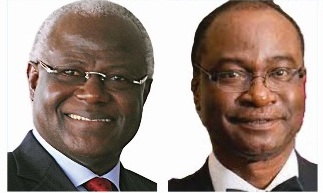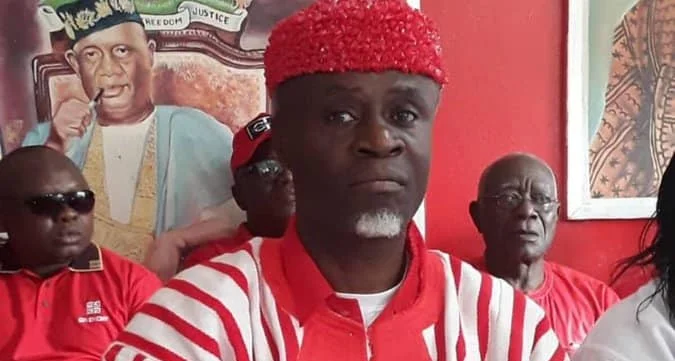By Hassan Osman Kargbo
The recent circulation of a leaked audio recording has ignited a wave of controversy within the Sierra Leone’s All People’s Congress (APC) party, raising questions of betrayal between key party figures. The focus has been on two prominent personalities: Dr. Samura Kamara, the party’s 2018 presidential candidate, and former president Ernest Bai Koroma.
The audio, allegedly featuring the voice of former President Koroma, accuses Dr. Kamara of secretly negotiating with the current government led by President Julius Maada Bio without the knowledge or consent of the APC leadership. However, the situation has also triggered a range of reactions and counter-allegations, leaving the APC divided and further deepening the party’s internal crisis in the country.
In the leaked audio, a voice believed to be that of Ernest Bai Koroma claims that Dr. Samura Kamara, in an act of betrayal, sought dialogue with the government without consulting with the APC executive or even the former President himself. The voice in the recording implies that Kamara signed an agreement for dialogue with the government, a move that was done secretly and without the party’s approval. The action, the audio suggests, directly contradicts the agreement made within the APC, as it was agreed that there would be no negotiations or compromises until the party had thoroughly addressed the irregularities of the June 24, 2023, Presidential election.
The leaked audio has caused uproar within APC circles, as many party members feel blindsided by Kamara’s alleged decision. The accusations point to a betrayal of trust, given the position Kamara held as the APC’s Presidential candidate. The party had invested significant resources and trust in Dr. Samura Kamara; and for him to allegedly engage with the ruling party on his own, bypassing party leadership, has not gone unnoticed.
As the leaked audio spreads, people’s views on the matter have been polarized. Some believe that Dr. Kamara’s actions were nothing short of a betrayal. “The APC entrusted him with the party’s presidential candidacy. He should have consulted with the leadership before making such significant decisions,” says a business man at Rawdon Street, a longtime APC supporter. “His actions have undermined the party’s efforts to challenge the election irregularities and build a united front.” he said.
On the other hand, there are those who argue that Dr. Kamara’s motivations were more nuanced. “If Kamara signed an agreement for dialogue, it could have been in the interest of the country’s peace and stability,” argues Fatimah, an APC youth leader. “In times of political tension, reaching out to the government for dialogue might be the most responsible move, even if it wasn’t pre-approved by the party’s top brass. Sometimes, personal initiative is needed to avoid further division and chaos.”
For some, however, the core issue lies not in Kamara’s actions but in the broader leadership struggles within the APC. They question whether the former President’s silence on the matter until now suggests his own betrayal of the party’s ideals and principles.
Furthermore, While Dr. Kamara faces accusations of betrayal, many are asking why former President Ernest Bai Koroma did not address such concerns earlier. After all, Koroma was well aware of the supposed negotiations between Samura Kamara and the ruling party. His failure to inform the public or even bring the matter to the APC’s attention has led many to question his motives. Critics argued that Koroma’s silence has allowed the situation to fester, weakening the party’s position and allowing divisions to deepen.
“I can’t understand why Koroma waited so long to make this known,” says Ibrahim, an APC member from the Western Area. “He knew about the negotiations and didn’t say anything. It seems like he’s been playing both sides—keeping the APC in the dark while trying to secure his place with the government. This is a betrayal, too.” Ibrahim noted.
Some see Koroma’s lack of transparency as a strategic move to protect his personal interests, rather than the interests of the party. His silence on Kamara’s alleged actions has only fueled suspicions that the former President might be trying to create distance from the APC in anticipation of future political positioning.
Also, the debate over betrayal within the APC also extends to the 2018 election, when Koroma chose Dr. Samura Kamara as the party’s Presidential candidate. Critics of Koroma’s decision argue that the former President’s choice of Kamara, despite other potentially stronger candidates within the party, was itself a form of betrayal. “Koroma had many options in 2018, but he chose Samura Kamara, who many knew was not the most competent person to lead the APC,” says Yusufu, an APC grassroots leader at Back Street. “Now, look where we are. The APC has lost significant support, and there’s division in the party. It feels like Koroma’s decision was more about loyalty to Kamara than what was best for the party.”
Supporters of Koroma, however, maintain that his decision was made with the best interests of the party in mind. They argue that Kamara was a seasoned diplomat with international experience, which was seen as an asset in the Presidential race. Yet, even such supporters cannot ignore the growing disillusionment within the APC ranks.
In addition, the recent controversy surrounding Dr. Kamara’s alleged betrayal, compounded by former President Koroma’s silence, highlights a larger issue within the APC: deepening division and a lack of cohesive leadership. The party’s failure to address the irregularities of the 2023 election has left many of its members feeling betrayed, not just by Kamara or Koroma, but by the entire leadership.
As the APC continues to grapple with such internal struggles, party members and supporters alike are left wondering how the party will recover from the rift. Will the leadership find a way to unite the party, or will this crisis lead to further fragmentation?
In the end, the accusations of betrayal, whether aimed at Dr. Samura Kamara, Dr Ernest Bai Koroma, or both, point to a fundamental failure in leadership and communication within the APC. Until the issues are addressed, the party will likely continue to face internal divisions and a loss of public trust.
The road ahead for the APC is uncertain, and only time will tell how the party can heal and move forward.













